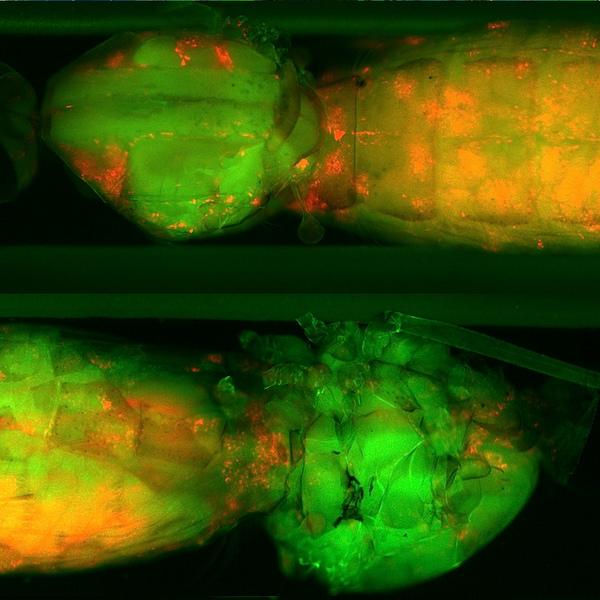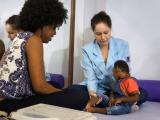Health groups today announced $18 million in funding to quickly ramp up large-scale use of Wolbachia-infected mosquitoes to fight Zika and dengue virus, with deployment slated for Colombia and Brazil in early 2017.
In other developments, Florida announced nine more local Zika cases today, and the World Health Organization (WHO) formally spelled out its Zika research agenda, based on consultations earlier this year.
Two urban areas targeted
The Eliminate Dengue Program (EDP), an international nonprofit research group that developed a way to transfer Wolbachia to Aedes aegypti mosquitoes, will handle the deployment, funded by support from the US and UK governments and two philanthropic groups: Wellcome Trust and the Bill and Melinda Gates Foundation.
When a WHO expert group met in March to discuss whether any new mosquito control tactics would help tamp down the spread of Zika, Wolbachia was one of only two methods it recommended for careful pilot testing. The Pan American Health Organization in April offered to provide technical support to help Zika-affected countries implement Wolbachia-related mosquito control programs.
Found in 60% of insects, Wolbachia doesn't typically infect Aedes aegypti mosquitoes. However, research has shown infected Aedes aegypti pass the bacteria to their offspring, blocking their ability to transmit Zika, dengue, and other viruses.
EDP has already conducted small field trials in in Australia, Indonesia, Vietnam, Brazil, and Colombia, which showed that local transmission of viruses can be stopped when a high proportion of mosquitoes in an area carry Wolbachia.
The expanded deployment will target two large urban areas: the greater Rio de Janeiro area in Brazil, and in Colombia across Bello and other parts of Antioquia. EDP researchers had conducted smaller field trials in the same two areas: Rio de Janiero in 2014 and Bello in 2015.
Scott O'Neill, PhD, EDP leader and professor in the Institute of Vector-Borne Disease at Monash University in Australia, said in a news release that the two philanthropic groups have supported the group's work since 2005 and that their new funding, and that of new donors, "is pivotal to us moving from small-scale trials to large city-wide deployment."
Upcoming deployment of Wolbachia mosquitoes will be one part of an ongoing partnership with Brazil's Fiocruz Institute that involves an additional $3.7 million in funding from Brazil's Ministry of Health and other contributions from Brazilian cities, according to the EDP.
Over the next 2 to 3 years, EDP investigators will study the impact of Wolbachia mosquitoes on transmission of Zika, dengue, and chikungunya in large urban settings.
Trevor Mundel, PhD, president of the Gates Foundation's global health division, said in the EDP news release, "Wolbachia could be a revolutionary form of protection against mosquito-borne disease. It's affordable, sustainable, and appears to provide protection against Zika, dengue, and a host of other viruses. We're eager to study its impact and how it can help countries."
Florida reports 9 new local infections
The Florida Department of Health (Florida Health) today reported nine more locally acquired Zika cases, one of them in a patient exposed in Wynwood who was sick in early August and whose illnesses was just confirmed by the US Centers for Disease Control and Prevention (CDC). Health officials said the case doesn't affect the lifting of the Wynwood from the Zika active transmission list, which happened more than a month ago.
Two of the patients were exposed in the two current Zika transmission areas, one in Miami Beach and one in Little River. Florida Health said the six other people were exposed in Miami-Dade County and that investigations are under way to pinpoint where they were infected. The 9 new cases announced today boost Florida's number of local Zika infections to 180.
Florida Health also announced one more illness in a patient with an undetermined exposure location, raising that total to six. It said the latest case-patient had traveled to an area outside Florida that is experiencing widespread Zika transmission as well as to Miami, making it difficult to tell where exposure occurred.
Meanwhile, the state's number of travel-related Zika infections also grew, with four more cases reported, three in Broward County and one in a pregnant woman. According to Florida Health, there are now 758 travel-related cases and 115 infections in pregnant women. Officials don't say where any of the pregnant women contracted the virus.
WHO unveils Zika research agenda
In other developments, the WHO today formally spelled out its Zika research agenda, which incorporates input from expert meetings in March that also covered vector control, diagnostic tests, management of complications.
According to the 15-page report, the WHO says it is best poised to provide leadership and leverage its coordinating power in the following key areas:
- Characterizing Zika infection and its complications with epidemiologic studies, clinical research, and lab tests
- Prevention and control, vaccine development, vector control, treatment, and regulatory support
- Addressing issues concerning women, communities, and health systems
- Coordination and management, such as developing common platforms for standardizing processes for sharing specimens, data, and information
- Providing research support activities, such as establishing an ethics working group to guide Zika-related research
The WHO said it would need $13.8 million from partners and donors to support the research agenda, which covers activities over a 2-year period that started in June.
Other developments
- CDC Director Tom Frieden, MD, MPH, said yesterday that it's probably too late to stop Zika virus from spreading through the United States, according a report from USA Today, based on his comments at the CityLab 2016 conference in Miami. He said Zika and other diseases spread by Ae aegypti mosquitoes aren't controllable with current technologies, and he predicted that Zika will become endemic in the hemisphere.
- Public information about Zika virus appears to be confusing the public about the importance of sex as a transmission route, two Swiss researchers from the University of Bern wrote yesterday in a commentary in PLoS Medicine. They noted sexual transmission is usually mentioned without noting the frequency. They said Zika isn't likely capable of sustained transmission through sexual intercourse and that while it's transmissible through that route, mosquitoes are the primary transmission route. They said advice to the public should give clear messages about the contributions of mosquito-borne, vertical, sexual, and bloodborne transmission so that people can make informed choices about prevention steps.
- Heat Biologics, a pharmaceutical company based in Durham, N.C., announced yesterday that it has signed an agreement with the University of Miami to license and develop its gp96 vaccine platform to garget Zika and other infectious diseases. According to a news release, clinical and preclinical studies suggest the gp96 platform, already used in cancer therapy, may have a role as a broad-based infectious disease vaccine and that ongoing studies suggest that immune response triggered by gp96 could stimulate Zika-specific immune response in the placenta, which might protect the fetus.
See also:
Oct 26 EDP media release
Oct 26 Wellcome Trust news release
Oct 26 Florida Health daily Zika update
Oct 26 WHO Zika virus research agenda





















